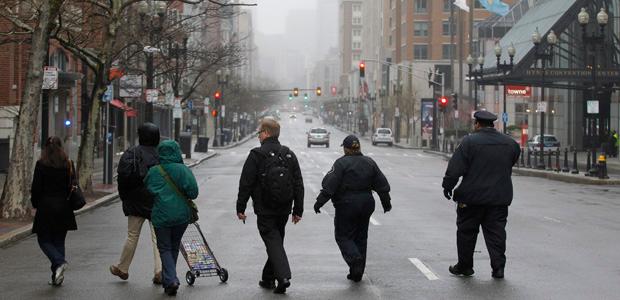Boston Bombing: Boylston Street ‘Back to Normal’
Boylston Street reopens for public access (Photo: REUTERS/Jessica Rinaldi)
The last stretch of the Boston Marathon course will never feel the same.
But Wednesday, those few blocks of Boylston Street in Boston re-opened to the public for the first time since the blasts on April 15th.
Residents and businesses – neighbors to the bombings and all the tragedy they caused – are trying their best now to get back to normal.
Freshly poured cement still drying on the repaired sidewalk was one of the more visible reminders of the events of the prior week. People are returning to their jobs. There are also a lot more police officers on the street Wednesday than normal, some police tape, and some construction.
Otherwise, Alec Papazian, a businessman who works the building next to the first blast, said the only thing really weird is the makeshift memorial just outside his office building at 699 Boylston.
"It's just a little strange that there is, like, flowers and people taking pictures down the street, you know, because it's where you work every day," he says. "That's probably the most surreal thing about everything. Hopefully it'll get back to normal pretty soon."
But what is normal?
Ashley McKinney, who also works in a building near the site of the first blast, says staying at home certainly wasn't normal.
"Working from home for the past week has been really hard being alone and just being able to think of everything and reflect on what happened," she said. "And I feel like being back at work is bringing more normalcy to my life there's a lot of security around here so it's not like I don't feel safe."
Six stories above Boylston Street, the people in one office had an incredible view of the finish line. It's become a tradition for people there to work on Marathon Monday. The boss brings in lunch.
Wednesday, the first day back, employees got a visit from the FBI. One of those workers, Joanna Kalogeropoulos, is wracked by images from that day. She said she's happy that she's back at work and life is getting back to normal, but she doesn't think there'll ever be answers to 'why?'
"Who understands every 'why' people do stuff like that? I don't understand it, I don't think I ever will. It doesn't make me feel any better knowing the details, you know," Kalogeropoulos says.
Knowing why might help, said Gerardo Defabritiis, general manager at The Tannery, a high end clothes and shoe shop at the corner of Exeter and Boylston Streets. It was doing brisk business on Marathon Monday. Defabritiis, who was working that day, said even if there are never any answers, people will move on with their lives.
"Yes," he said, "(they'll move on) with some fears, with some more caution — where they go, who they are with, who's next to you — but unfortunately there's no safe place in this world anymore. It can happen anywhere."
With that in mind, Boston authorities will likely beef up security all over the city, especially for next year's marathon.
Tina Reid, who works at the 7-11 next to the bomb site, said, "so be it."
"You know, if you're inconvenienced by people trying to make you feel safe, then you're really kind of a jerk. I don't feel like it's 'big brother is watching.' I mean, what are you doing that you're afraid that someone is watching you?"
People across the river in Cambridge were inconvenienced Wednesday. Roads and bridges were closed as US Vice-President Joe Biden joined thousands of mourners at a memorial service for the MIT police officer allegedly murdered by the bombing suspects. Mourners had to make their way through tight security, including metal detectors and bomb-sniffing dogs.
